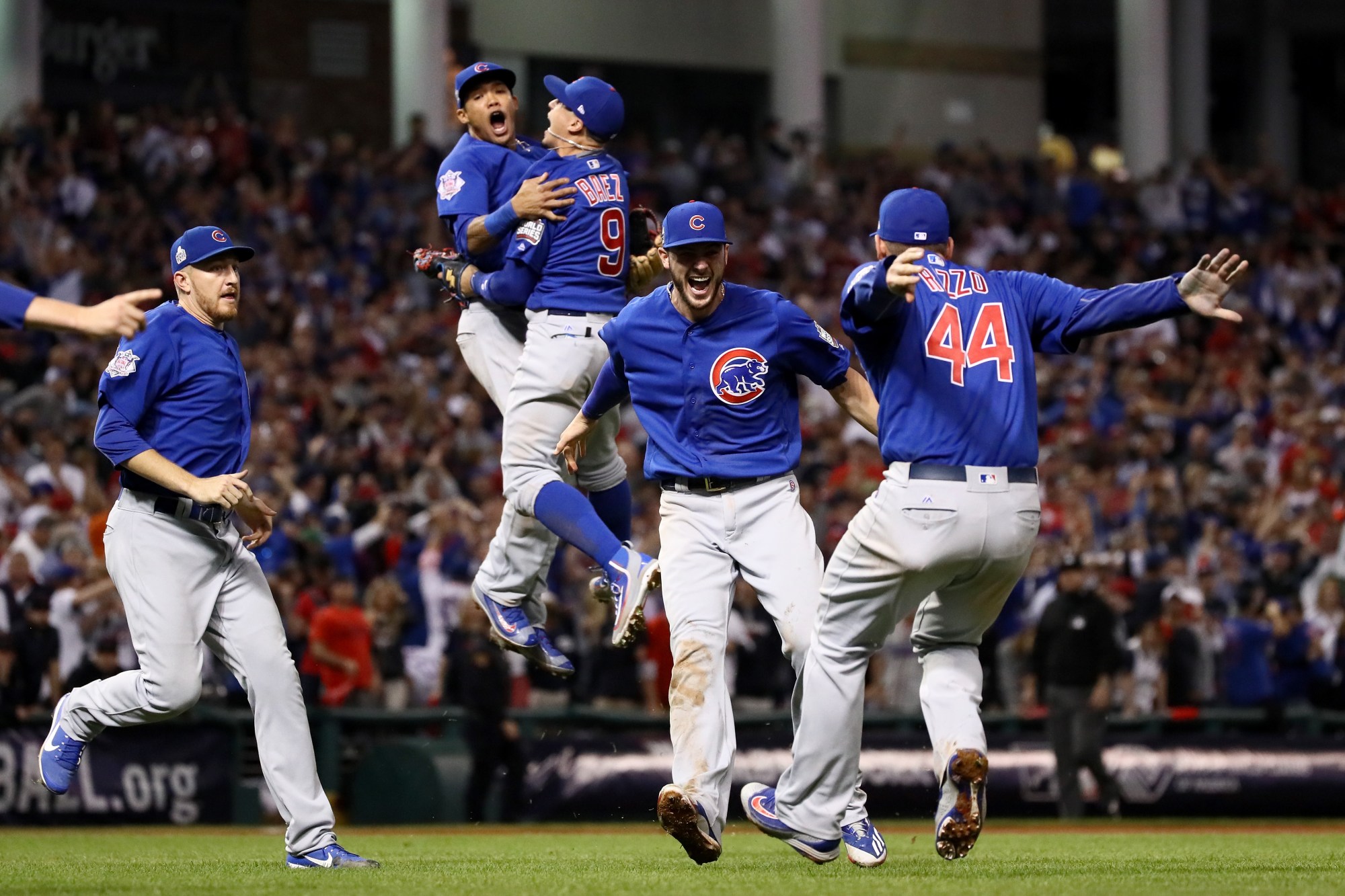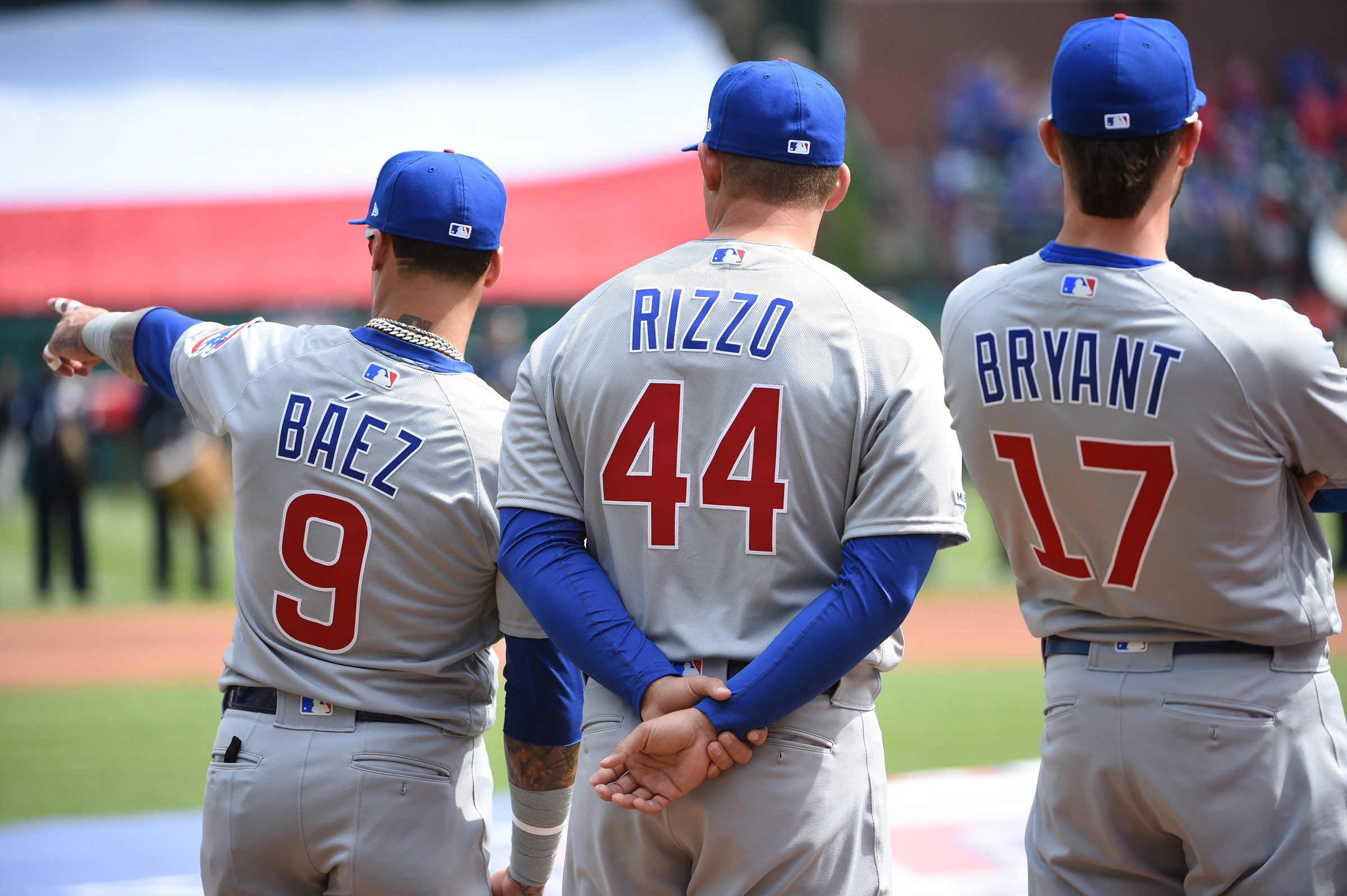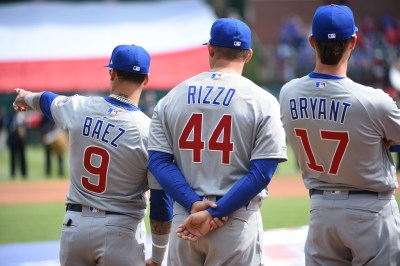A few minutes after 10 p.m. on Tuesday, Cincinnati Reds reliever Edgar Garcia grooved a 95 mile an hour sinker off the inside corner, and Kris Bryant launched it 368 feet into Wrigley Field’s left field bleachers, sending the tens of thousands of Cubs fans who stuck around until the ninth inning into a frenzy. Tag Team’s “Whoomp! There It Is” blared over the public address system, and an eagle-eyed TV cameraman caught a fan thrusting her homemade “Kris We ❤️ U” sign as high into the air as she could.
His 160th career home run for the Cubs would also be his last. Bryant was traded to the San Francisco Giants on Friday, with the Cubs exchanging the erstwhile Rookie of the Year, four-time All Star, and Most Valuable Player for a 21-year-old outfielder and 24-year-old pitcher. The North Siders dealt away first baseman Anthony Rizzo and shortstop Javier Báez, too. Faced with the prospect of doling out hundreds of millions of dollars to keep an aging nucleus intact, management chose door number two: Selling their stars to competitive clubs in the hopes of building “the next great Cubs team.”
It’s a funny thing, watching your favorite baseball team unravel over time. It happens slowly at first—gradual enough to evade detection, even—then all at once. Like the Ship of Theseus, you wake up one morning to find the whole roster has been turned over. All but four regulars from the Cubs’ 2016 championship-winning team were back the following season. After this week’s sell-off, only four remain.
“What matters most,” Rizzo told reporters after taking one final walk along Wrigley’s trademark ivy-covered walls with his family, is “leaving this place better than when I found it. I can say that the mission was accomplished.”
If that’s the bar, Rizzo cleared it with ease. He was traded to a hapless Cubs organization in 2012 that would go on to lose 101 games that season—the second most in the league. But his presence alone gave fans reason to hope for a better future. It was too much weight to put on the shoulders of a 22-year-old kid in remission from Hodgkin’s lymphoma, but it was a role that in retrospect, no one but Rizzo could fill. He leaves nine years later a husband, the namesake of the Lurie Children’s Hospital’s waiting room, and the heart and soul of the team that broke the Cubs’ 108-year World Series drought.
Most of the time, baseball is a game—except for when difficult decisions need to be made. Then it’s a business.
Explaining his rationale for the firesale, Cubs President Jed Hoyer pointed out the contracts of the players he moved expire in two months, arguing their talent would have been wasted on a team staring down the barrel of a fourth-place finish. “We did everything we could to take that asset that was about to expire and make the best of it,” he said on a Zoom call.
Most of the time, baseball is a game—except for when difficult decisions need to be made. Then it’s a business.
It’s Hoyer’s job to think in those terms—emotional decision-making in his line of work is a recipe for stagnation—but it’s too much to ask of fans. To them, Báez isn’t an “asset”—he’s the man who hit a game-winning home run in his 2014 major league debut and can do the impossible on the basepaths and in the field. Bryant’s the second-overall draft pick the Cubs’ 101-loss season yielded; the guy local sports talk radio built up as the Chosen One who actually managed to live up to the hype. Rizzo is the spokesman for Buona Beef, and the inspiration for hundreds of dogs’ names across the Chicagoland area.
For nearly a decade, that trio made up the core of the greatest chapter in Cubs baseball history. Summer after summer—night in, night out—tens of thousands of fans made the trek to the corner of Clark and Addison to experience the magic for themselves, and hundreds of thousands more beamed it into their living rooms. People went off to college, lost loved ones, had children, fell into and out of love. But on good days and bad, Rizz, KB, and El Mago were there, giving it their all. And most of the time, that was enough.
In his introductory press conference back in 2011, wunderkind baseball executive Theo Epstein promised Cubs fans a World Series championship and a team that “will be playing baseball in October consistently.” He delivered on both counts, yet the era’s conclusion can’t help but feel somewhat hollow. Perhaps it’s how the story ended, with the protagonists being unceremoniously shipped off from a middle-of-the-road club without a proper goodbye. Or maybe it’s explained by the exodus coming a year or two earlier than expected.
For many, though, it’s because the vaunted team Epstein assembled—for whom early on the fates seemingly never ceased to align—only reached the promised land once. Prior to 2016, most Cubs fans would have sold their soul for a single World Series title; asking for a second would be unthinkable. But after reaching the mountaintop for the first time in over a century, an inescapable thought began to creep into the fanbase’s collective psyche: What if this is only the beginning?

It was a reasonable question. The championship-winning team was not only the league’s best, but one of the youngest. Sports Illustrated titled its story on their World Series victory “The First Night of the Cubs’ Dynasty.”
It never came to pass. The team has only won one playoff series since—in 2017—and it mortgaged the future to do it. Individuals have shone, but the organization as a whole failed to recapture the spark that in 2016 engrossed a city—and the world. The euphoria of that first run led to a years-long sense of suspended disbelief: How could this group of players—who, together, accomplished the impossible—not figure out a way to do it again? Management gave them four-and-a-half seasons to try before pulling the plug this week, and now they never will.
Maybe that’s okay. Maybe, the 2016 Cubs were never the immortal world-beaters they were enshrined as, but simply a group of 25 guys destined to come together for a summer and do something magical. “All good things come to an end,” Rizzo said Thursday. “The best nine, 10 years of my life [were] here. The memories here will last forever. That’s why I always cherished every moment. I leave with no regrets.”
Rizzo hit a home run in his Yankees debut Friday night; Baez and Bryant will suit up for the Mets and Giants, respectively, on Saturday. All three now find themselves in the thick of the playoff race. The Cubs, meanwhile, are now projected to finish the season ten games under .500—but they have a 22-year-old top prospect who’s inching closer to the Major Leagues. Hope springs eternal.







Please note that we at The Dispatch hold ourselves, our work, and our commenters to a higher standard than other places on the internet. We welcome comments that foster genuine debate or discussion—including comments critical of us or our work—but responses that include ad hominem attacks on fellow Dispatch members or are intended to stoke fear and anger may be moderated.
With your membership, you only have the ability to comment on The Morning Dispatch articles. Consider upgrading to join the conversation everywhere.